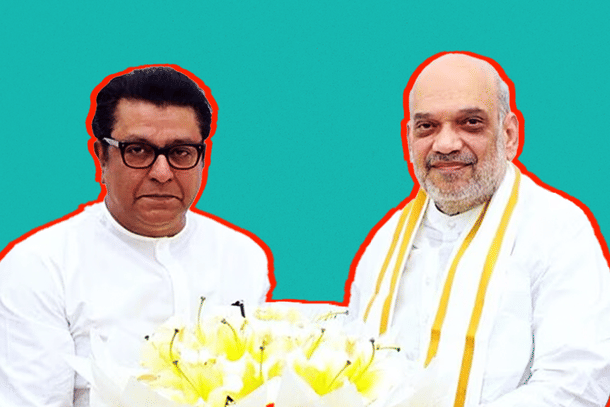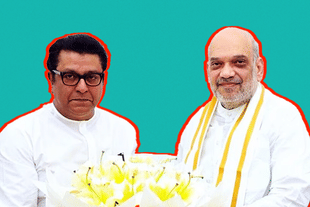Politics
Will An Alliance With MNS Amp-Up BJP's Appeal To The 'Marathi Manoos'?
Krishna Dange
Mar 19, 2024, 06:37 PM | Updated 07:19 PM IST
Save & read from anywhere!
Bookmark stories for easy access on any device or the Swarajya app.


Maharashtra Navnirman Sena (MNS) has been in talks with the Bharatiya Janata Party (BJP) to join its Mahayuti coalition in Maharashtra for more than a month now.
According to the reports, MNS chief Raj Thackeray met senior BJP leader and Home Minister Amit Shah in New Delhi on 19 March 2024, as the saffron party too is reportedly keen to have MNS in the National Democratic Alliance.
If an agreement is reached, BJP might ask its allies in the state — Nationalist Congress Party led by Ajit Pawar and Eknath Shinde’s Shiv Sena — to give away one seat each from their quota to MNS for the upcoming 2024 Lok Sabha polls.
Both senior leaders of the BJP in the state — Deputy Chief Minister Devendra Fadnavis and Union Highways Minister Nitin Gadkari — are said to be on good terms with Raj Thackeray.
According to a Free Press Journal report, BJP leaders are said to be of the belief that having MNS as a coalition partner will help get the Marathi-factor on its side. The party also intends to bank on the latter’s support base in parts of Mumbai and Thane, along with those in Nashik and Pune.
The Marathi Manoos Factor
Maharashtra was born out of a fierce linguistic agitation that saw loss of 107 lives. Post the formation of the state in 1960, firstly Balasaheb Thackeray’s Shiv Sena and decades later MNS founded by his nephew Raj Thackeray spearheaded the cause of protecting the rights of 'sons of the soil' and the Marathi language.
Notably, while both parties were termed as ‘anti-social’ and ‘lumpen’ by its left-wing critics, the cadre base of both — Sena and MNS has always had a large number of white-collared literate as well as working class Maharashtrians. This is more so since both parties have been dominant in the highly-literate Mumbai Metropolitan Region (MMR) and also because Sena’s offshoots such as the Sthanik Lokadhikar Samiti had helped several graduates secure jobs in private, as well as public sector undertakings.
However, in the wake of the changing political environment, Sena later gave up its fierce pro-Marathi stance. On the other hand, Raj Thackeray's MNS picked the 'Marathi Manoos' cause only to soften up and accept the ideology of Hindutva in 2020 after being reduced to only one MLA in the assembly.
Will An Alliance With The MNS Help BJP?
Ever since both Senas and MNS seem to have given up their Marathi and Maharashtra first agenda, there is now a palpable feeling among the Marathi-speaking working class residents especially in MMR that there is no one left to protect their interests.
While MNS cadre continues to indulge in acts of vandalisation to assert its presence such as breaking signboards devoid of Marathi, in the present, it is certainly not a party with mass-appeal as it was in the past.
If viewed in a longue duree approach, BJP has been courting MNS for a long time now. If the talks between them are fruitful and if MNS joins the Mahayuti, more than BJP it is the MNS which stands to benefit by being a part of the ruling coalition.
Firstly, not only has the electoral performance of MNS been dismal during the state assembly polls, the party was also unable to retain its only urban local body where it was in power — Nashik Municipal Corporation — after being routed out by the BJP in 2017.
Secondly, in the Mumbai city, its core area of influence, the part has not only been unable to expand but has also failed to protect itself from defections. In the recently concluded term of the elected house that governs the Municipal Corporation of Greater Mumbai (MCGM), MNS was left with a single corporator after six of its seven elected corporators defected to the ruling benches of Shiv Sena in 2017.
Considering this and the fact that several candidates from other parties part of Mahayuti in the past elections were able to get themselves elected due to the pro Modi-wave, if things work out well, MNS might be able to recover its losses.
An Opportunity For BJP To Free Itself Of ‘Maharashtra-Drohi’ Tag
If the reasoning behind the attempts to woo MNS is believed to be true, the question is — why look for a coalition partner merely to portray the party as pro-Marathi and Maharashtra, when it is something which ideally BJP can and should do by itself?
As is the case with many ideologies, playing on linguistic sentiment is a double edged sword. While its application in extreme can result in demands for separation as seen in the case of demand for Dravida Nadu in the past, if tamed the right way, it has a strong potential to bring together masses that hitherto remain divided on the lines of caste and religion.
Here’s why picking up the cause of ‘Marathi Manoos’ and his pride by itself can potentially aid BJP:
1) Maharashtra politics is majorly dominated by male politicians with aristocratic background. BJP's topmost leader in the state, Devendra Fadnavis, is seen as an able administrator and an astute political strategist. However, Fadnavis with his 'Brahmin' caste background has been having a tough time building a support base among the numerically dominant Marathas, especially in the rural hinterland of the state.
Mother tongue and the literature in it is something that's close to the heart of every Marathi speaker. This is evident through the 'Grantha-Dindis' that are carried out across the state with great pomp and gusto on Marathi Rajbhasha Divas every year. Resolving publicly to protect Marathi and further the cause of the local Maharashtrian youth can benefit Fadnavis and inter-alia BJP, to broaden its support base.
2) Maharashtra unit of BJP keeps drawing flak for not aggressively stating that they are committed to protecting the interests of Maharashtra. In fact recently when asked as to why the ruling government didn't do enough to stop prospective industrial projects from going to Gujarat, Fadnavis reportedly said, “Gujarat isn't Pakistan, so what if a few projects went there?” While what Fadnavis said is understandable, a blunt response of this manner invited a barrage of criticism from the Mahayuti supporters as well the opponents.
In fact, BJP’s opponents from the Maha-Vikas Aaghadi have consistently called the saffron party 'Maharashtra Drohi' for supposedly having failed to protect the interest’s of the state. On the contrary, Karnataka BJP seems to have managed to converge the linguistic sentiment inter-alia regional pride with Hindutva. This can be seen through its support for the agenda of Kannada activists of not letting Belagavi dominated by Marathi speakers be given away to Maharashtra, or its opposition to part with Kaveri water to Tamil Nadu.
Taking a cue from the neighbouring unit of the party and coming up with something like 'Sthanik Lokadhikar Samiti' that was Sena's USP once and which helped Marathi speaking graduates get jobs, Maharashtra BJP can come clean of the allegations that it is ‘kow-towing before Gujarat.’
3) Despite the pre-dominance of Bollywood, changing linguistic demography and tastes of the audience, Marathi theatre and cinema continues to hold a position of prestige in the state.
In the regional entertainment industry, there are presently several Marathi actors and actresses who have never shied from displaying their affection for Hindutva icons like Savarkar or Shiv-charitrakar Babasaheb Purandare. Moreover, these actors come from different social as well as regional backgrounds. They also have a large fan following in the state.
Culture has always been a potent vehicle for conveying the political agenda. In fact, in the case of a few political parties like that of the Dravida Munnetra Kazhagam in Tamil Nadu, theatre and cinema has played an important role in mobilising masses along the party-lines.
Since Marathi literary, theatre and cinematic tradition despite being close to the heart of Maharashtrians has in the recent past rued about the lack of state-support, addressing their concerns in the way artist unions of MNS and Sena do, could also help the BJP widen its support base on linguistic lines.
Despite having been in power in the centre since 2014 and having secured the largest number of seats in the state assembly in 2014 and 2019, BJP is compelled to seek new allies in Maharashtra. Considering this and the fact that the party has to rely on sub-regional leaders who keep shifting their loyalties, converging Marathi sentiment with Hindutva can help BJP consolidate its political position in the state.
Staff Writer at Swarajya





